

The dust has settled on the African Union Commission election. For Kenya’s Raila Odinga, the loss marks the end of a high-stakes bid that many had hoped would cap off his decades-long career in public service.
Now, attention shifts to what comes next for the veteran politician, whose influence in Kenya remains as strong as ever.
At 80, Raila is no stranger to political setbacks, nor is he one to fade quietly into the background. His bid for the AU’s top job was widely seen as an opportunity for him to transition from local politics to a continental leadership role.
However, with that door now closed, many are wondering whether he will remain an active force in Kenyan politics or take on a new role in shaping the country’s future from behind the scenes.
Raila’s recent collaboration with President William Ruto’s administration has been one of the most signi cant political realignments in Kenya’s history.
Once bitter rivals, the two leaders have found common ground in bipartisan talks aimed at addressing governance and economic challenges.
This shift has been met with mixed reactions—some see it as a strategic move that positions Odinga as a statesman above party politics, while others view it as a departure from his legacy as a steadfast opposition figure.
The AU election loss presents an opportunity for Raila to reassess his role in Kenya’s political landscape. He remains a key player, and his next move could determine the future of the opposition, the direction of governance reforms, and even the 2027 elections.
Despite not securing the AU role, Raila still holds signi cant political capital that he can use to shape Kenya’s governance in meaningful ways.
First, he could take on the role of a political mentor, guiding a new generation of leaders within his party, ODM, and the broader opposition. By nurturing young politicians, he can ensure continuity in his vision for democracy, economic empowerment and institutional reform.
Secondly, Raila could use his experience to champion key governance reforms. Over the years, he has been at the forefront of constitutional changes and electoral justice. Even without an elected position, he can still push for policies that strengthen democracy, transparency, and accountability.
Another area where Raila could make an impact is in promoting national unity. Kenya’s political history is deeply intertwined with ethnic and regional divisions.
Having positioned himself as a unifying figure in past elections, he can now lead efforts to bridge these divides, fostering dialogue and reconciliation at a national level. Finally, Raila could shift his focus to policy research and advisory roles.
Establishing or working with think tanks focused on governance, economic policy, and development could allow him to shape the country’s future in a different but equally impactful way. His infiuence in policy discussions would ensure that progressive ideas continue to shape Kenya’s economic and political strategies.
Raila Odinga has built a political career defined by resilience, reform, and a relentless pursuit of justice. The AU election loss does not diminish his stature; rather, it offers him an opportunity to redefine his role in Kenya’s future.
Whether he chooses to remain in active politics, take on an advisory role, or dedicate his time to policy and governance initiatives, his presence will continue to shape Kenya’s political discourse. With the 2027 elections on the horizon and Kenya navigating economic and governance challenges, Raila’s next steps will be crucial.
His ability to adapt and reinvent himself has always been a defining trait. Now, he has the chance to leave a lasting legacy—not just as a politician but as a statesman dedicated to shaping Kenya’s future.








